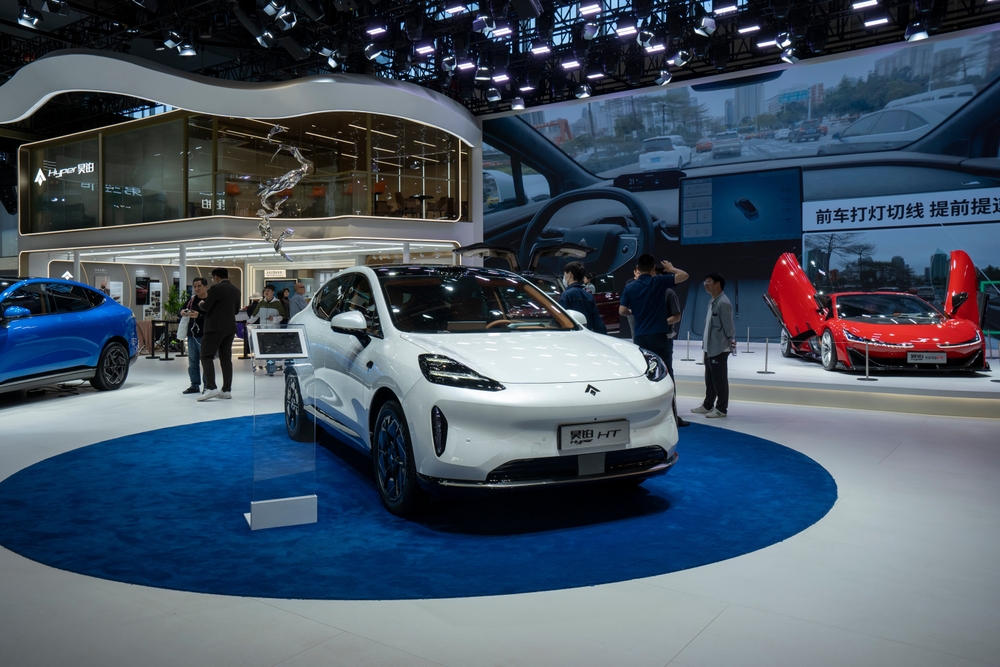The automotive industry is experiencing a paradigm shift, and China is at the forefront of this revolution. Chinese electric cars are not only transforming the way we perceive automobiles, but they are also offering an affordable and environmentally friendly alternative to traditional gas-powered vehicles. With technological advancements and innovative designs, Chinese electric vehicles (EVs) are emerging as serious contenders on the global stage.

The Rise of Chinese Electric Vehicles
The electric vehicle market has experienced exponential growth over the past decade, and China plays a crucial role in this rapidly evolving landscape. As the world's largest auto market, China has embraced electric vehicles with open arms, achieving a significant milestone in early 2023 when EVs surpassed 50% of new car sales in the country. This milestone highlights China's commitment to reducing emissions, improving air quality, and becoming a leader in clean energy initiatives.
Chinese automakers, such as BYD, NIO, and XPeng, have been at the forefront of this change. They are investing heavily in research and development to produce vehicles that can compete with traditional automakers. For instance, NIO is known for its high-performance electric cars equipped with advanced battery technology, while XPeng focuses on smart features and autonomous driving capabilities.
Affordability: Chinese Electric Cars Are Cheaper Than You Think
One of the most compelling aspects of Chinese electric cars is their affordability. Unlike their Western counterparts, Chinese automakers have managed to lower production costs through economies of scale, local sourcing, and government incentives. As a result, consumers can find a wide range of affordable electric vehicles that cater to different needs and preferences.
For example, the Wuling Hong Guang Mini EV, produced by a joint venture between SAIC Motor, the Wuling brand, and General Motors, has become a symbol of affordable EVs in China. Priced at just a fraction of what Tesla vehicles cost, this compact car appeals to urban dwellers seeking an economical and environmentally friendly form of transportation. The availability of such low-cost vehicles makes it easier for consumers to make the switch from traditional combustion engines to electric alternatives.
Technological Advancements in the Chinese EV Sector
Chinese automakers are not only focusing on affordability but also investing heavily in cutting-edge technology to enhance the performance and appeal of their electric vehicles. One such innovation is battery swapping technology—a system that allows drivers to quickly replace a depleted battery with a fully charged one in a matter of minutes. This eliminates the need for lengthy charging sessions and extends the vehicle's range.
According to a BBC report, companies like NIO are pioneering battery swap stations, which could redefine convenience for EV owners. These stations are already operating in China and provide a glimpse into the future of electric mobility, where time-consuming charging becomes a thing of the past.
Furthermore, Chinese automakers are leading the way in developing autonomous driving technology. XPeng, for example, has equipped its vehicles with smart features that enable semi-autonomous driving and advanced driver assistance systems. These innovations not only improve safety but also enhance the overall driving experience.
The Global Impact of Chinese Electric Cars
The rise of Chinese electric cars has significant implications for the global automotive market. As demand for EVs grows worldwide, Chinese automakers are setting their sights on international expansion. Companies such as NIO and XPeng are already exporting their vehicles to countries in Europe and Asia, signaling a shift in the global automotive landscape.
This expansion poses both challenges and opportunities for established automakers who have traditionally dominated the industry. On one hand, the influx of affordable and technologically advanced Chinese electric cars increases competition, driving the need for innovation and efficiency. On the other hand, it presents an opportunity for collaboration and partnerships that can accelerate the development of greener technologies.
Additionally, the increasing presence of Chinese electric vehicles in the global market emphasizes the importance of sustainable practices and environmental responsibility. Countries and consumers alike are recognizing the need to reduce carbon emissions and are turning to electric cars as a viable solution.
Challenges and Opportunities Facing Chinese Automakers
While Chinese automakers have achieved remarkable success in the electric vehicle sector, they still face several challenges. International expansion requires navigating regulatory environments, establishing brand recognition, and building distribution networks in new markets. Furthermore, concerns about quality control and intellectual property protection remain barriers that need to be addressed.
Despite these challenges, Chinese automakers have numerous opportunities to continue their trajectory of growth. They can leverage partnerships with global companies to enhance their technological capabilities, expand their product offerings, and gain access to new markets. Additionally, as consumer demand for electric vehicles continues to rise, there is ample potential for further innovation and improvement in EV technology.
Conclusion: The Future of Chinese Electric Cars
The rise of Chinese electric cars signifies a transformative moment in the automotive industry. With their affordability, technological advancements, and global expansion, Chinese automakers are poised to lead the charge toward a sustainable future. As they continue to innovate and refine their offerings, the global market can expect to see an increasing presence of Chinese electric vehicles that challenge the traditional norms of transportation.
For further insights, explore more about China's electric vehicle revolution at WebProNews, Carwow, amongst other informative sources. These resources provide valuable perspectives on the impact of Chinese EVs and the transformations taking place in the global automotive market.




